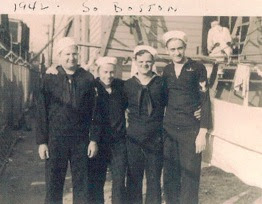Today
is Memorial Day, a day to remember and honor the men and women who have served
our country in the armed forces. I’d like to begin sharing the memories of one
of those patriots, my father, who served in the United States Navy during World
War II.
He
left a trove of mementos from those years – photos of fellow crew members, a
framed picture of his ship, his uniform, medals, a brief history of his long service,
artifacts, souvenirs, shells and weapons from the South Pacific. But what I now
find most informative and moving is the cache of letters my mother treasured
through fifty years of marriage until her death – every letter my father wrote
to her from the day they first met in 1941 until my father’s discharge from the
Navy in 1946, a few weeks before I was born.
My
mother has been dead for nearly twenty years, my father nearly eleven. As the
family historian I’ve been in possession of these letters since 1994, but
unable to read them until recently. They were found in a box in my mother’s
closet. Also in the box was a petrified slice of wedding cake and a dried rose,
the remains of their expeditious wedding in 1944, during my father’s brief
leave after serving in the Pacific for nearly two years.
In
1994 I put the box in my own closet where it remained until my father’s death
in 2002. I brought it out thinking that might be the time to start reading the
letters. It wasn’t. The first card and letters were written by a stranger, a
man in love, a sweet young man I had never known. I cried for their long ago
love, but only as I would cry for the lovers in a Hallmark Channel movie, not my
parents.
No
one in the family wanted the stone cake and dead rose, so I buried them with my
parents and put the box of letters back in the closet.
Last
year while planting Dad’s favorite red, white and blue Memorial Day flowers at
the cemetery, I decided it was time to read the “war” letters. Once I started I
couldn’t stop. What happened to this young man in the war? Who were these young
people that I only knew old? Why did Dad’s Navy career end in a hospital at
Camp Peary?
Thanks
to Dad’s own recordkeeping I had enough information to order his military and
medical records from the National Archives, where most World War II military
records are now stored, and found more surprises.
Now
I plan to spend the next few years following Dad’s letters from the Boston Navy
Yard to New Guinea and back, traveling where I can, talking to people, research,
whatever I can.
Mom
and Dad’s story began at Lakeville State Sanatorium in Lakeville,
Massachusetts, sometime in early 1941. The Lakeville hospital was originally
built to treat tuberculosis patients and later expanded treatment to polio
victims, including my father’s older brother, my Uncle Fred. Mom was a nurse’s
aide, living at the hospital, when she met Dad on one of his regular visits to
his brother. According to family legend it was classic love-at-first-sight.
The
first item in Mom’s letter box is a very ordinary Easter card one might have
sent to a casual acquaintance in 1941. But on the back is note from Dad to Mom that
today seems so guileless a proposal . . . “I don’t like to be too forward but I
would really like to get better acquainted with you. Hope that you can spare me
an evening soon” and he formally signed his full name. Obviously that first
date, whenever and wherever, was a success.
A
few months later . . . Pearl Harbor, December 7, 1941.


